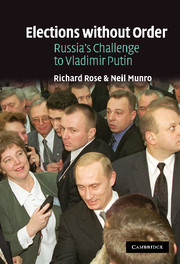Book contents
- Frontmatter
- Contents
- List of figures
- List of tables
- Introduction. The reality of Russia
- 1 A disorderly legacy
- 2 Democratization backwards
- 3 What Russians have made of transformation
- 4 Presidential succession: a Family problem
- 5 Parties without accountability
- 6 A floating system of parties
- 7 Impact of transformation on Duma voters
- 8 From acting to elected president
- 9 Campaigning and governing
- 10 In search of an equilibrium
- Appendix A New Russia Barometer samples
- Appendix B Coding of independent variables
- References
- Index
4 - Presidential succession: a Family problem
Published online by Cambridge University Press: 22 September 2009
- Frontmatter
- Contents
- List of figures
- List of tables
- Introduction. The reality of Russia
- 1 A disorderly legacy
- 2 Democratization backwards
- 3 What Russians have made of transformation
- 4 Presidential succession: a Family problem
- 5 Parties without accountability
- 6 A floating system of parties
- 7 Impact of transformation on Duma voters
- 8 From acting to elected president
- 9 Campaigning and governing
- 10 In search of an equilibrium
- Appendix A New Russia Barometer samples
- Appendix B Coding of independent variables
- References
- Index
Summary
Transferring control of a new regime from the leader who founded it to a successor is a critical political moment, for it shows whether the regime is personal, ending when its leader leaves the scene, as in Franco Spain, or whether it has continuity independent of its founder, for example the People's Republic of China. As Boris Yeltsin's second term moved toward its close, the critical issue was whether his successor would be the second president of the Russian Federation or the first head of a new regime. Boris Yeltsin's reliance on vlast made it uncertain how the transfer of power would occur.
President Yeltsin surrounded himself with a Family of loyal supporters who had as much at stake as he had, for when he left office their access to political power would expire. Its members tended to be people who in an earlier era would have sought to be close to the tsar. A family of close personal advisors is familiar in other countries, for example Tony's cronies in Blair's Downing Street or the Kennedy clan in the White House. However, in modern states personal favouritism is constrained by strong laws and norms missing in the Russian Federation.
Inside the Kremlin, President Yeltsin had a changing set of favourites, some valued for their political or technical expertise, others as companions on the tennis court or in drinking sessions, and some because their loyalty was unquestionable, such as Boris Yeltsin's younger daughter, Tatyana Dyachenko, a campaign consultant in 1996 and appointed to the Kremlin post of media consultant the following year.
- Type
- Chapter
- Information
- Elections without OrderRussia's Challenge to Vladimir Putin, pp. 82 - 100Publisher: Cambridge University PressPrint publication year: 2002



